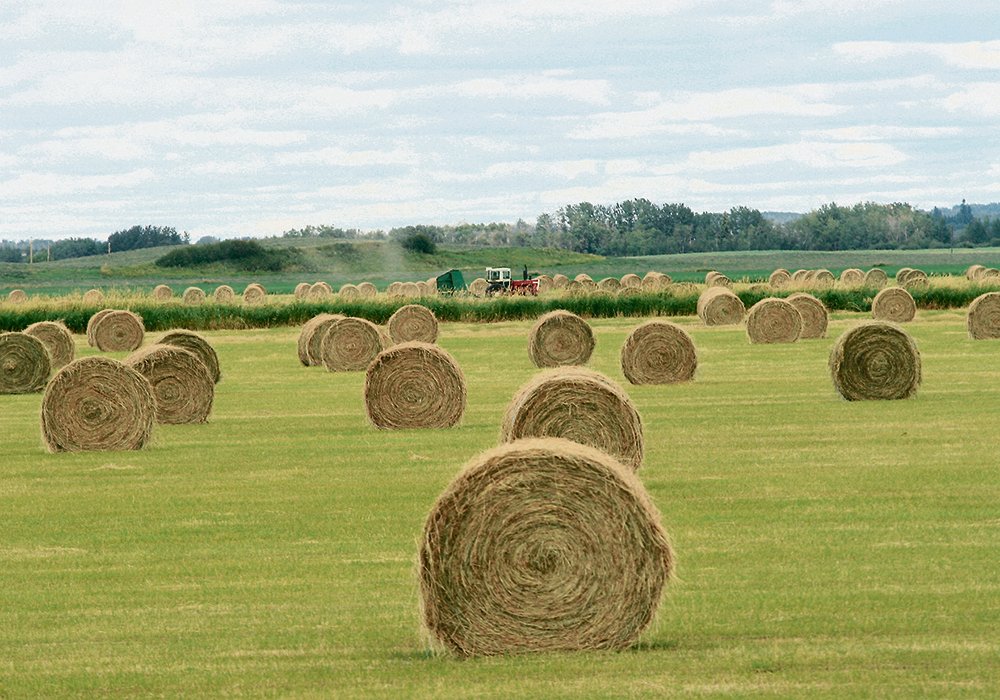Prairie producers explore revived Hay West initiative

Alberta farmers seek options for help as searing heat and shortage of rain take their toll on crops and pastures
Western Canadian producers scrambling to find ways to feed their cattle due to drought and prolonged high temperatures could potentially get hay from farmers in Eastern Canada.
The idea was raised by Lynn Jacobson, president of the Alberta Federation of Agriculture, at a recent meeting of the Canadian Federation of Agriculture. He said a precedent was set by the Hay West campaign, which saw farmers in eastern provinces provide hay to Alberta producers during a drought in 2002.
Reviving the program would require the involvement of Canada’s railways, as well as the federal government, said Jacobson, who is also a director at the CFA.
“The people on the board of the CFA that had excess hay said, ‘well, we don’t know exactly what to do with all our stuff.’ Yeah, they’d be willing to share, but it’s just an idea raised again saying, ‘well, maybe we need to start that again’.”
Alberta Beef Producers has asked for help ranging from obtaining feed and tax deferrals to getting the provincial government to trigger the federal-provincial AgriRecovery disaster relief framework. Provincial Agriculture and Forestry Minister Devin Dreeshen said several actions are being taken.
“With a federal election looming, Alberta received verbal commitment from Ottawa that a joint AgriRecovery program will be initiated to support prairie producers affected by drought conditions prior to an election,” he said in a statement. The program’s details were still being developed, he added.
Alberta also has a water pumping program that includes the emergency filling of dugouts for livestock, said Dreeshen.
“Producers can rent pipe and pumping equipment from the province to fill dugouts or other suitable catch basins from nearby water sources for their animals.”
Due to the fact that as many as two-thirds of AFA members have been affected by the crisis, Jacobson said the organization will likely be asking the provincial Agricultural Financial Services Corp. to allow farmers to provide damaged crops as feed for livestock producers.
“Do it early, instead of waiting until harvest when everything’s died down and there’s no feed value at all anymore.”
Dreeshen said he has “advised crop adjusters to be flexible and complete early assessments with affected crop and hay land — for example offering alternative use of crops to address forecasted feed shortages in our livestock industry.”
However, Alberta’s opposition NDP said the governing United Conservative Party recently eliminated 69 full-time jobs and closed five rural satellite offices at the AFSC.
“I have heard from farmers across the province that they’ve already seen the impact of UCP cuts to AFSC staffing,” NDP agriculture critic Heather Sweet said in a statement.
“Far too many claims are left waiting nearly a year for compensation. That cannot happen this year, especially not with the major destruction we are seeing.”
She called on the provincial government to immediately rehire all laid off AFSC employees, as well as create an Emergency Crop Assessment Task Force “to ensure every single claim from this year’s drought is settled and paid out by the end of this year.”
The crisis shows the flaws in the current response to agricultural emergencies, said Jacobson. Farm organizations across Canada have been asking for adequate business risk management programs to be put in place.
“Then you wouldn’t have to be going to the ad hoc (emergency bail-out payments) and all the other things you have to look at,” said Jacobson.
Source: www.producer.com

